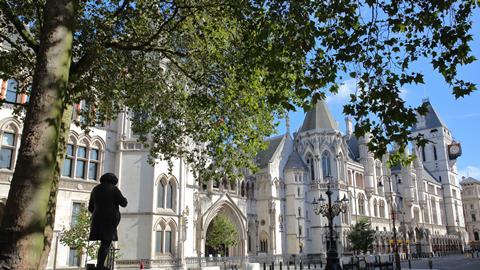A high-powered Court of Appeal case heard submissions yesterday on a pivotal issue for the litigation funding industry.
In Commercial and Interregional Card Claims Ltd v Mastercard and others, the chancellor of the High Court Sir Julian Flaux, deputy head of civil justice Lord Justice Birss and Lord Justice Green will rule on the validity of litigation funding agreements (LFAs) based on a multiple of funding provided.
The issue is important for the funding industry because the vast majority of LFAs now provide for payment based solely on a multiple of funded capital. Since the Supreme Court’s ruling in PACCAR, funding agreements can no longer use the alternative approach of charging a percentage of damages, because they would then become damages-based agreements (DBAs). DBAs are not permitted in opt-out proceedings in the Competition Appeal Tribunal, and most LFAs do not comply with DBA regulations and so would be rendered unenforceable.
In the joint appeals, Sony, Visa, Mastercard and Apple, defendants in class actions in the Competition Appeal Tribunal, are challenging the validity of the claimants’ funding arrangements. They argue that the agreements qualify as DBAs because they provide for the class representative to pay a multiple of costs ‘subject to a cap by reference to the total damages or some part thereof’.
The appellant companies maintain that all the agreements contain an express or implied cap, as the funders’ fees cannot exceed the available damages. This therefore satisfies the definition of a DBA under s58AA of the Court and Legal Services Act 1990, since the payment is ‘determined by reference to the amount of the financial benefit obtained’. Without the cap, however, the defendants accept that the agreements would not become DBAs.
Read more
In the first day of the hearing yesterday, all three judges made a number of challenges and interjections. Sir Julian Flaux said: ‘It’s very bizarre, that something [ie. the cap] that is designed to protect the litigants and the class representative, leads to something being unenforceable; whereas if it were open season so far as the amount is concerned, it would be enforceable… You may be right or wrong, but it’s a pretty odd situation, and we seem to have got ourselves into a right old mess with it.’
Counsel for the appellants argued that the law had been designed to address a problem with claims managers, who were not solicitors, being able to impose unfair terms on clients in employment cases. He said: ‘The definition of what is a DBA is the same in all these contexts, so anything you do to put a band aid on LFAs in collective actions in the CAT, is going to affect the definition of what is a DBA in the employment tribunal as well… you’ll open up again the possibility for the very kinds of conduct that the lord chancellor tried to prevent in the DBA regulations 2010, that’s been carried through to the 2013 regulations.’
Green LJ remarked that following the defendants’ line of argument, claims managers would be free to do this anyway provided they did not include a cap; and no DBA would therefore be created.
Appearing for the respondents, who are the various class representatives in the proceedings, Nicholas Bacon KC said the defendants’ submissions did not make ‘coherent sense’ and would result in ‘quite extraordinary outcomes for the civil justice system’.
Citing the PACCAR ruling, Bacon said the relevant issue was to identify the ‘primary contractual entitlement’ under the LFA. ‘In our case the “primary contractual entitlement” has nothing to do with the level of the damages. It’s a multiple of their capital funded; sometimes deployed, sometimes reserved, but either way, it’s a multiple of funding. It’s got nothing to do with the damages at all,’ he said.
Bacon added: ‘Parliament would be causing unimaginable injury if it thought, in 2015 when it legislated against the use of DBAs in the CAT, that it was effectively closing the doors to [litigation funding], because the government knew at that point that [the only way] opt-out proceedings could be pursued was with litigation funding.’
Bacon’s submissions continue today.
The seven cases in the appeal are:
(1) Alex Neill Class Representative Ltd (claimant/respondents) v Sony Interactive Entertainment Europe Ltd & anr (defendants/appellants) ; (2) Apple Inc. & Apple Distribution International Ltd (defendants/appellants) v Kent (class representative/respondent); (3) Visa Inc & ors (defendants/appellants) v Commercial & Interregional Card Claims II Ltd (applicant/respondent); (4) Commercial & Interregional Card Claims I Ltd (applicant/respondent) v Visa Inc & ors (defendants/appellants; (5) Commercial & Interregional Card Claims I Ltd (applicant/respondent) v Mastercard & ors (defendants/appellants); (6) Commercial & Interregional Card Claims II Ltd (applicant/respondent) v Mastercard & ors (defendants/appellants); (7) Gutmann (respondent) v Apple Inc & ors (appellants)
































No comments yet